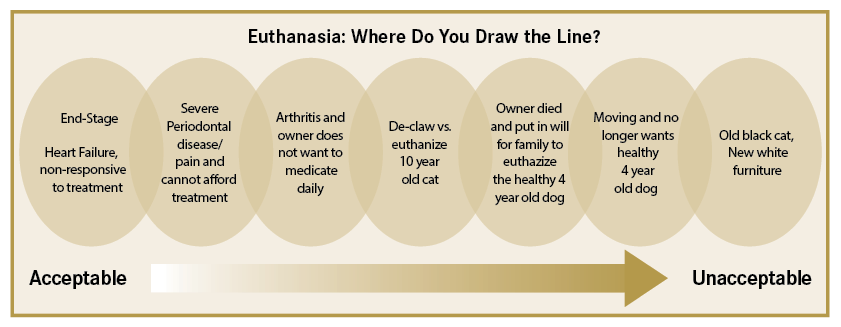Understanding, Avoiding and Conquering Ethics Exhaustion
When your sense of right and wrong is being compromised, the first steps are to recognize and discuss the problem.

Compassion fatigue and burnout are well recognized in the veterinary profession, yet not all practitioners agree on their definitions. Others don’t identify with the concepts or have been unable to put a label on what they are grappling with in their daily lives.
A relatively new concept, ethics exhaustion differs from compassion fatigue, burnout and other emotional problems experienced in the veterinary profession. It may hold the answer that veterinarians struggling with a sense of indifference have been looking for.
Ethics Exhaustion: Definition and Causes
Sonnya Dennis, DVM, DABVP (Canine/Feline), coined the term “ethics exhaustion” to indicate the fatigue, emotional distress and lack of will to continue to act in a way that is consistent with what you believe is the ethical thing to do.
“Ethics exhaustion is not a loss of compassion. Rather, it happens when you’re prevented from acting on what you believe is the compassionate and caring thing to do so often that you stop trying or caring,” said Dr. Dennis, who owns Stratham-Newfields Veterinary Hospital in Newfields, New Hampshire.
RELATED:
- Can Veterinarians Beat Moral Stress?
- Compassion Fatigue: Techniques to Ease Stress
Although the concept has similarities with compassion fatigue and burnout, she said, it is in a category of its own. When veterinarians suffer from ethics exhaustion, instead of feeling emotionally exhausted as they would if they were burned out, or experiencing an increase in apathy as they would if they had compassion fatigue, they are devoid of all feelings. When encountering a difficult euthanasia situation, for example, a veterinarian with ethics exhaustion would say, “Sure, I’ll euthanize that patient. I don’t care. It doesn’t matter anymore,” Dr. Dennis said.
Ethics, as used here, is a code of moral conduct or rules you follow because of a sense of duty, not convenience. Ethics is not alterable by circumstance and is the sense that you are doing the thing that you should do.
Ethics exhaustion can be caused by several factors:
- Conflict between what you believe is right and what you must do
- Repeatedly doing what you don’t feel is right
- Your feelings of helplessness being minimized by others
- Trouble defining what is the right thing to do
- Mismatch between your ethical beliefs and your behavior
Veterinarians encounter several sources of conflict in practice, but “it all comes down to prioritizing your ethical duty,” Dr. Dennis said. When veterinary professionals start to feel the fatigue and emotional distress of ethics exhaustion, several signs begin to appear and overrun their professional lives.
Behavioral Drift
“Over time, all these situations pushing and pulling on us can cause us to become realigned,” Dr. Dennis said. “We think, I must do this action even though it is not the right thing to do.”
On the scale of acceptable and unacceptable, for example, where would you draw the line when it comes to the reasoning behind euthanizing a pet? Dr. Dennis explained that the line usually starts off earlier and, as one continues to practice, veers off course. If that line is shifting, this is a type of behavioral drift (Figure).

“Did you change your beliefs or just give in?” Dr. Dennis asked. “It’s one thing to actually change what you believe to be ethical yet another thing entirely to believe one thing but do another. That is what can severely affect you and our profession over time.”
Ethical Learned Helplessness
Learned helplessness is a condition in which someone suffers from a sense of powerlessness or the persistent failure to succeed. It can cause you to think:
- I’m too exhausted to continue to do what I believe is right.
- No one cares. Why should I?
- I might as well do it because someone else will.
- It’s not my fault. I had no choice.
- I’m just following orders.
“It’s easy to become discouraged, but we may be able to unlearn our helplessness,” she said. Just because you gave in once doesn’t mean you have to do it repeatedly.
Overcoming Ethics Exhaustion
The best way to rid your practice of the negative effects of ethics exhaustion is to prevent it from happening in the first place. There are several things that each veterinary team member can do.
- Employees: Commit, in writing, where you will not compromise when it comes to services you may be asked to perform. Ask about clinic policies and whether the leadership is open to discussions about them.
- Supervisors: Create a safe environment to discuss ethical conflicts. Recognize that ordering an employee to do something may cause more harm than necessary. Have written policies regarding certain practices.
“Veterinarians experiencing ethics exhaustion don’t want absolution; they want resolution,” Dr. Dennis said. If you’re experiencing behavioral drift, “grab an oar and start rowing again. Find some friends to help you.”
When it comes to learned helplessness, it can be tremendously beneficial to remind yourself that just because something didn’t work in the past doesn’t mean it’s doomed in the present. “Circumstances change,” she said. “Try, and try again.”
If all else fails, change your environment, change your job, change your profession and seek help to combat the stress associated with ethics exhaustion.
“Ethics and ethical conflicts really, really are giant,” Dr. Dennis said. “These topics can’t be taboo. We have to have a dialogue, and we have to remain a team.”